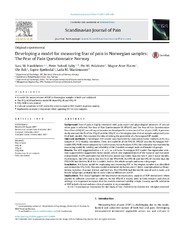Blar i forfatter "Lyby, Peter Solvoll"
-
Comparison of Two Multidisciplinary Occupational Rehabilitation Programs Based on Multimodal Cognitive Behavior Therapy on Self-Rated Health and Work Ability
Lyby, Peter Solvoll; Johansen, Thomas; Aslaksen, Per M. (Journal article; Tidsskriftartikkel; Peer reviewed, 2021-08-23)Objective: Musculoskeletal pain and common mental disorders constitute the largest proportion of people who are on sick leave. This study investigated the efficacy of two multidisciplinary occupational rehabilitation programs on self-rated health and work-related outcomes. The interventions were identical in content but differed in length. It was hypothesized that a longer inpatient program would ... -
Developing a model for measuring fear of pain in Norwegian samples: The Fear of Pain Questionnaire Norway
Vambheim, Sara Magelssen; Lyby, Peter Solvoll; Aslaksen, Per M; Flaten, Magne; Åsli, Ole; Bjørkedal, Espen; Martinussen, Laila Marianne (Journal article; Tidsskriftartikkel; Peer reviewed, 2017-10-01)<p><i>Background - </i>Fear of pain is highly correlated with pain report and physiological measures of arousal when pain is inflicted. The Fear of Pain Questionnaire III (FPQ-III) and The Fear of Pain Questionnaire Short Form (FPQ-SF) are self-report inventories developed for assessment of fear of pain (FOP). A previous study assessed the fit of the FPQ-III and the FPQ-SF in a Norwegian non-clinical ... -
Failure to Find a Conditioned Placebo Analgesic Response
Flaten, Magne; Bjørkedal, Espen; Lyby, Peter Solvoll; Figenschau, Yngve Anton; Aslaksen, Per M (Journal article; Tidsskriftartikkel; Peer reviewed, 2018-07-30)<p><i>Background</i>: Associative learning has, in several studies, been modulated by the sex of the participant. Consistent with this, a recent review found that conditioned nocebo effects are stronger in females than in males.</p> <p><i>Purpose</i>: It has been suggested that conditioned placebo responses are stronger in females, and this hypothesis was investigated in the present study. Cortisol ... -
Fear of pain potentiates nocebo hyperalgesia
Aslaksen, Per M.; Lyby, Peter Solvoll (Journal article; Tidsskriftartikkel; Peer reviewed, 2015-10-12)Nocebo hyperalgesia has received sparse experimental attention compared to placebo analgesia. The aim of the present study was to investigate if personality traits and fear of pain could predict experimental nocebo hyperalgesia. One hundred and eleven healthy volunteers (76 females) participated in an experimental study in which personality traits and fear of pain were measured prior to induction ... -
The Fear of Pain Questionnaire-III and the Fear of Pain Questionnaire-Short Form: a confirmatory factor analysis
Vambheim, Sara Magelssen; Lyby, Peter Solvoll; Aslaksen, Per M.; Flaten, Magne; Åsli, Ole; Martinussen, Laila Marianne (Journal article; Tidsskriftartikkel; Peer reviewed, 2017-08-08)<i>Background</i>: The Fear of Pain Questionnaire-III (FPQ-III) is a widely used instrument to assess the fear of pain (FOP) in clinical and nonclinical samples. The FPQ-III has 30 items and is divided into three subscales: Severe Pain, Minor Pain and Medical Pain. Due to findings of poor fit of the original three-factor FPQ-III model, the Fear of Pain Questionnaire-Short Form ... -
Individual differences in pain and placebo analgesia : the role of fear.
Lyby, Peter Solvoll (Doctoral thesis; Doktorgradsavhandling, 2012-10-16)The title of the PhD thesis is “Individual differences in pain and placebo analgesia – the role of fear”. Placebo analgesia refers to the reduction in pain after the administration of an inert treatment with the information that pain will be reduced. Pain reduction is therefore not attributable to the treatment, but to the conscious belief or expectation that the treatment is effective. However, not ...


 English
English norsk
norsk




